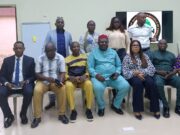In a bold move to turn the tide on Nigeria’s import-dominated trade landscape, government and stakeholders are implementing significant measures to boost exports and unlock the nation’s vast economic potential.
This shift stems from a stark reality: currently, aviacargo imports surge at 95%, leaving a meager 5% for exports. This imbalance, experts warn, must be addressed for Nigeria to achieve sustainable economic growth.
Identifying the roadblocks to flourishing exports, officials have pinpointed issues like non-compliance with international standards, excessive fees and taxes, and poor packaging and certification practices. Rejected exports due to these factors have long plagued the sector, highlighting the need for stringent quality control and adherence to global benchmarks.
At the beginning of this new year, a new wave of optimism washes over the industry. One of Nigeria’s ground handling companies, Nigeria Aviation Handling Company, NAHCO Aviance has set ambitious plans in motion, aiming to empower farmers and equip them with the knowledge and resources to cultivate internationally sought-after produce.
At a recent press conference in Lagos, NAHCO’s Managing Director, Indranil Gupta, passionately declared, “Nigeria has all it takes to earn more Forex from export.”
Gupta envisions Nigeria as the “breadbasket of the continent,” emphasizing the untapped riches within both intercontinental and intracontinental trade.
He calls for increased awareness among producers, middlemen, and airport operators to unlock this hidden potential.

To facilitate a seamless export process, NAHCO has constructed a state-of-the-art processing facility, a one-stop shop for exporters to prepare their products for global markets. This ambitious project, costing over N1 billion, exemplifies their commitment to revolutionizing cargo exports and achieving international standards.
Gupta underscores the urgency of this shift, stating, “As of today, cargo is nearly 95% import-dependent, tying us to the country’s economic capabilities. Exporting earns dollars, providing foreign exchange, a more advantageous approach for the nation.”
This initiative doesn’t end with Lagos. NAHCO plans to replicate these processing centers across key airports in Abuja, Enugu, Kano, and Port Harcourt, with a special focus on revitalizing Kano’s historical agricultural prominence.
Prince Saheed Lasisi, Head of Commercial and Business Development at NAHCO, explains, their commitment extends beyond infrastructure, adding that, NAHCO staff recently underwent rigorous training in London on international packaging and quality control measures, ensuring adherence to global standards and minimizing future export rejections.
Lasisi explains, they have received the green light from the Kano state government for collaboration to get the people back to the farms. This collaborative spirit signifies a united front, determined to transform Nigeria’s trade landscape and propel the nation towards a future fueled by robust exports and economic prosperity.



























